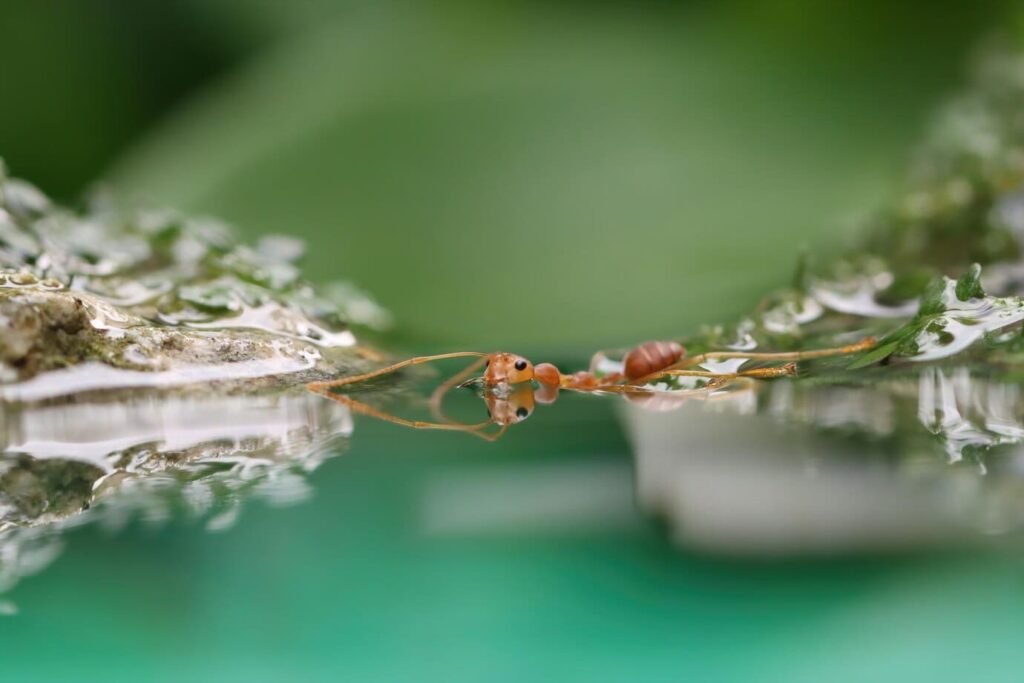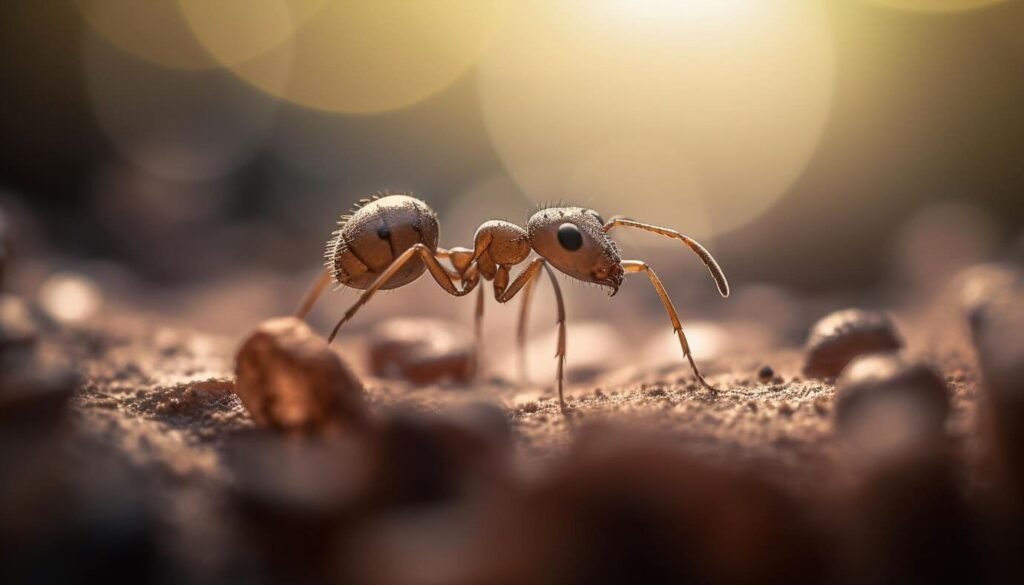


As a kid, I spent countless hours peering into anthills in my backyard, fascinated by the tireless industry of these tiny creatures. During heavy rains, I wondered if their underground tunnels ever flooded. And when I experimented by dropping ants into puddles, I was amazed that some actually paddled across the surface instead of drowning!
It sparked a lifelong curiosity – can ants swim? Or are they doomed if faced with deep water? As it turns out, the relationship between ants and water is far more complex than my childhood assumptions. Read on for an inside look into ants’ surprising amphibious capabilities.

Many ant species have a water-resistant outer coating on their exoskeleton that allows them to survive when submerged. Hydrofuge surfaces cause water to bead up rather than soak in, like a wax coating on a car. This protection gives ants more time to right themselves and prevent drowning if plunged into water.
Some worker ants also trap tiny air bubbles around their bodies before diving underwater. Ants are resourceful engineers, able to manipulate surface tension to create storage compartments. These emergency oxygen pockets let them breathe, neutrally buoyant, for up to two weeks!
Other ants have adaptations allowing them to withstand long periods without oxygen when submerged. Red imported fire ants slow their metabolism to near comatose states, surviving up to seven days fully underwater. Talk about holding your breath!
Next Step: Experiment by carefully submerging different ant species in water. Time their survival rates as they employ clever bubble and metabolic strategies!
Given their tiny size, you might expect ants to sink like stones. But their lightweight exoskeletons allow many species to float on the water’s surface. Researchers found the golden ant (Polyrhachis aurea) uses its spiny legs as oars to propel itself across the surface at high speeds after falling into tropical jungle streams.
The ability to remain afloat grants ants ample opportunity to scramble to safety if they accidentally fall into bodies of water. Floating allows them to survive floods and cross wider sections of streams or puddles by paddling. It beats sinking to the bottom and drowning any day!
Next Step: Go check streams and puddles after big rainstorms. You might spot floating ant rafts taking advantage of high buoyancy to migrate away from flooded nesting sites.
While ants are clearly no Olympic swimmers, a few species actually can propel themselves purposefully across the water’s surface for short distances. Long, stilt-like legs allow them to mimic rowing motions that pull them forward through paddling.
Researchers studying American Allegheny mound ants found they could traverse up to 39 inches across calm water through coordinated paddling! They use their legs as oars, while angling their water-repellent abdomens to steer in desired directions almost like rudders. Group coordination accomplishes long distance migration.
Seeing ants intentionally navigate through streams and puddles always amazes me. It proves that although they appear small and fragile, clever cooperation helps ants overcome this mobilty challenge as well through paddling adaptations.
Next Step: Use a magnifying glass to inspect ants crossing puddles after rain. You might catch their paddling technique in action!

Not all ants share the same capacity when it comes to confronting water obstacles. Habitat plays a huge role in determining what survival strategies different species evolve. There’s a wide spectrum between champion swimmers like the diving ant (Crematogaster laevis) and more aquaphobic species like harvester ants found in deserts.
The aptly named diving ant inhabits tropical mangrove swamps and is actually a skilled underwater hunter. It constructs its wood-based nests over riverbanks, allowing workers to plunge below the surface and trap prey like worms up to 30 minutes thanks to special tapered abdomen tips that trap air bubbles.
Meanwhile, arid-zone species like harvester ants rarely encounter more than the odd puddle. With no evolutionary need, they lack protective coatings and become trapped in surface tension forces upon contact with water. Situational exposure pressures drive adaptations.
Next Step: Observe ants around bodies of water – do some appear timid and hesitant while others confidently charge forward? Take note of these microhabitat differences within your neighborhood.
Stand at the edge of a vast lake, and you likely won’t spot many ants braving a crossing. Why? They avoid open waters for good reason! Beach-stranded ants become stressed when separated from their kin and the familiarity of land masses.
Even ants capable of effortful paddling stick close to shorelines. Straying into waters void of chemical pheromone trails and swarm intelligence is extremely risky. Random flailing is unlikely to land them back on dry ground. Safely crossing large open waters requires levels of navigation beyond most ants’ capabilities.
Smart ants wait for floating debris like sticks or leaves to piggyback across bigger bodies of water rather than plunging straight in. Patience pays off when you’re an inch long and fighting to stay afloat! Even the most flood-hardy ants choose caution when waters span beyond sight of land.
Next Step: Take a close look at streams the next time you’re hiking. Notice the ants crossing – do they stay tightly clumped or spread apart? Clues show how they assess risk across moving water barriers.
Though ants generally avoid getting wet, seasonal floods can still overtake nests. Incredibly, ants demonstrate cooperative survival behaviors that allow them to evacuate rising waters en masse. Species like fire ants use the buoyancy effect to their advantage, linking legs and forming living rafts atop the water!
Others frantically build ladders and bridges out of debris, dirt, and even their own bodies to provide escape routes for queen and larvae to higher ground if flooding occurs. The scene of ants pulling off against-the-odds rescues straight out of an action movie! From tiny insects, mighty partnership emerges even in crisis.
Next Step: Check YouTube for amazing BBC and National Geographic ant flood footage revealing their unbelievable survival behaviors in action. You’ll gain a whole new admiration for their capabilities!
Can ants swim? As with most things in nature, the answer is complicated. Very few demonstrate meaningful mobility in the water. And aquatic locomotion is certainly not their strong suit by evolutionary design. Yet through ingenious adaptations like floating, cooperation, engineering, and physiochemical changes, ants nonetheless survive and even thrive in wet habitats.
Understanding the nuances in their relationship with water allows us to further appreciate the remarkable diversity and problem-solving seen across the over 12,000 ant species around the world. Watching ants overcome the challenges wet environments pose for their scale never ceases to amaze me!
So while competitive swimming is likely off the table, excluding ants from your next pool party might not be necessary after all. These survival mechanisms prove they can handle an accidental splash or two with their characteristic resilience. Though I don’t recommend testing the limits of any anthills near your backyard hot tub!
Why don’t ants swim for transportation?
While some ants can propel across water by paddling, most lack adaptations for swimming as a regular form of locomotion. Open waters void of navigational pheromone trails pose substantial risks without guarantee of reaching land. Ants avoid unnecessary hazards from drowning or exposure by generally staying out of deep water.
Can ants hold their breath underwater?
Certain ant species have special means of underwater breathing like trapping air bubbles around their bodies with hydrophobic cuticles. Others drastically slow metabolism to withstand oxygen deprivation for days. But most will drown fairly quickly if fully submerged, lacking respiratory systems adapted for gas exchange underwater.
Do ants ever build nests in water?
No, ants avoid flooding risks by constructing nests in well-drained areas, digging channels to redirect water. Some nest in wood over streams but don’t inhabit underwater areas directly. Moisture regulation and gas exchange requirements generally keep ants terrestrial despite adaptations allowing some exposure risk.
Why don’t ants sink when floating on water?
Many lightweight ant species float thanks to natural buoyancy and water tension effects. Hydrophobic coatings cause water to bead up around limbs rather than soak in, allowing them to stay above surface. Long spiny legs also aid flotation instead of sinking upon falling into water.
How far can ants travel over water?
While ants aren’t strong swimmers, certain species can traverse impressive distances over calm waters through determined paddling. Researchers observed Allegheny mound ants coordinating to paddle at least 39 inches across a water surface when stimulated. But most stick close to shorelines to avoid hazards of deep waters during transit.